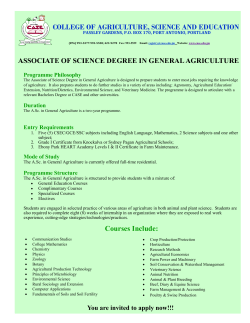
ARIDWASTE,
2 ARIDWASTE, Development of specific agricultural practices with the use of recycled wastes suitable for intensively cultivated Mediterranean areas under degradation risk Coordinator: Victor Kavvadias, Soil Science Institute of Athens, Hellenic Agricultural Organization “DEMETER”, Greece. vkavvadias.kal@nagref.gr Objectives The overall objective of the ARIDWASTE project is to research, advance and finally develop alternative low-cost and environmentally friendly agricultural practices across the Mediterranean basin with the use of treated agricultural wastes (AW) by recycling nutrients and water from treated agricultural waste also taking advantage of the beneficial, unique properties of natural zeolites. ARIDWASTE’s strategic impacts also focus on the reduction in crop management running costs, strengthening the linkage between the agricultural management sector and the marketing sector, promoting the competitiveness of Mediterranean agricultural products and profits while contributing to the protection of health, the improvement of the quality of life, environmental sustainability and food safety, mainly at waste disposal areas. Partners: • MIGAL, Galilee Technology Center, Israel • Centro di Sperimentazione e Assistenza Agricola (CERSAA), Italy • Centro de Edafología y Biología Aplicada del Segura - Consejo Superior de Investigaciones Científiicas, (CEBAS-CSIC), Spain Duration: 06/2012-05/2015 Grant: 317 000€ Keywords: Application practices, recycled wastes, degradation, soil quality, sustainability Project website: www.aridwaste.gr Workplan For this, ARIDWASTE includes specific tools and carefully designed actions to guarantee the sustainable use of treated AW in 12 agriculture and to protect and improve seriously degraded cultivated soils in the Mediterranean area, such as: a comprehensive critical review of AW management strategies; quality tests of treated wastes in terms of their physicochemical properties, soil quality parameters, phytotoxicity and plant response; field tests in selected areas, consisting of a representative farming community in different agro-ecological zones; a quantitative and qualitative impact analysis of AW application; development of an integrated scenario for the sustainable use of the treated wastes in extensive crop production providing site-specific diagnoses up to recommendations available for end users, the agribusiness sector and policy makers in order to select as appropriate for their local conditions. Testing areas allow joint team efforts in assembling information for knowledge gaps, testing and refining methods and technologies, and interaction with the ultimate beneficiaries of the project activities. This coherent proposal unites top-level interdisciplinary scientific knowledge, expertise and know-how while the participants, via an active cooperative role with stakeholders, will lead to consumer-demand dissemination of the results and subsequently the rapid take-up of ARIDWASTE’s innovative outcomes..
© Copyright 2025





















